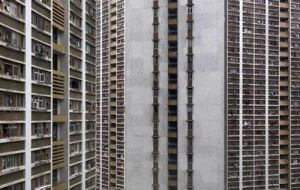MercoPress. South Atlantic News Agency
China imposes restrictions to foreigners in the real estate market
 One flat is enough if you have worked in China the previous 12 months
One flat is enough if you have worked in China the previous 12 months China's Ministry of Housing and Urban Rural Development announced this week that purchases of housing by overseas organizations and individuals in the country would be capped or restricted, a move widely seen as combating speculative money from overseas that might flow into the property market.
The ministry also joined the Foreign Exchange State administration in issuing a release calling for the standard management of housing purchases by overseas organizations and individuals.
Under the new rules, foreigners would only be eligible to purchase one flat for their own use, and they are required to provide proof of having worked in the country for at least one year prior to the purchase. Foreigners would also need to provide a written statement proving they have no other homes in the country when making home purchases.
Also, individuals from China's Hong Kong, Macao, and Taiwan would need to provide documents proving they are working, studying or residing on the mainland when they make home purchases.
Regulations announced by the Chinese government in 2006 did not specify the number of home purchases allowed by overseas individuals.
Furthermore, the new rules also require that foreign organizations in the country may only purchase non-residential housing in the cities of their registration to be used as offices, rather than as residential homes. This contrasts with previous regulations, which did not ban foreign institutions from buying residential homes for private use.
China's foreign exchange regulator has repeatedly warned of “hot money” inflows into the country amid heightened fears of asset bubbles and increasing pressure from inflation, which rose to a 25-month high of 4.4% in October.
The recent “quantitative easing” monetary policy by the United States has also added to the concerns of hot money inflows into emerging economies with higher interest rates.
However China is also exposed to an enormous liquidity fostered by easy access to credit and the huge stimuli package implemented by Beijing to offset the global slowdown. This has led to fears of speculative bubbles in real estate and in the stock exchange.




Top Comments
Disclaimer & comment rulesCommenting for this story is now closed.
If you have a Facebook account, become a fan and comment on our Facebook Page!